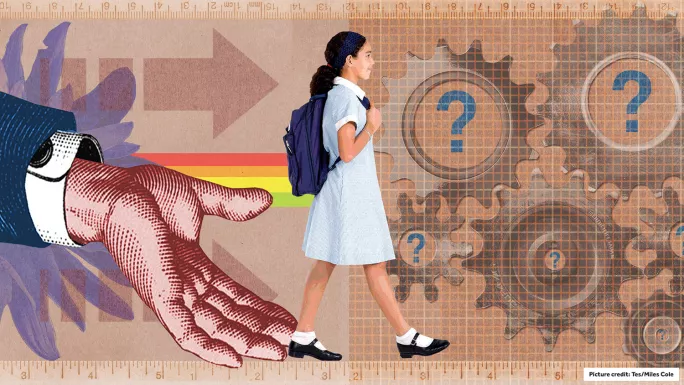Two sides meet in the middle to fix transition

Mark Enser (M): I see transition as having two parts to it: academic and pastoral. I would argue pastoral transition has really improved over the years, with Year 7 pupils seeming much more confident and comfortable on their arrival in secondary. I think the taster days (and in some cases, entire taster weeks) are making a difference and there seems to be much more work done in support of pupils on the SEND (special educational needs and disability) register to make the transition. Does this match your experience from a primary perspective?
Amelia Ellis (A) : On the whole, yes, especially regarding the improvement in SEND transition arrangements. However, certain aspects of transition could be developed still further. In my experience, when secondary school teachers come to talk to Year 6 pupils prior to transition days, sometimes these meetings can be a little lacking in true empathy for pupils. By this, I mean the sessions can feel hurried and a bit tired - very scripted. I think Year 6 pupils anticipate these events eagerly and are sometimes left feeling a little flat.
Also, I always respond in detail when secondary schools request information on behaviour and friendships, so they can effectively plan groupings, yet so often this is ignored. Since Year 6 teachers know their pupils very well, ignoring their advice could mean that a new Year 7 pupil fails very quickly. I have seen this happen.

M: That is sad to hear. I think there is often a tension in planning both transition days and the previsit meetings. You want pupils to arrive in Year 7 being enthusiastic for their new school, but you also want them to get a genuine taste of what lessons will be like and that they will need to work hard. What else do you think secondary schools should do differently in the meetings and on the transition days?
A: Bringing secondary school ambassador students to the meetings is popular with Year 6 pupils, although I do not think they should be overly relied upon by schools. It is important that pupils see teachers running the event - in terms of respect for authority.
I also think that sport is underplayed; low-attaining pupils who are good at sport would find more focus on this to be pleasing, and it might help to allay their fears about transition. I think asking Year 6 pupils to complete a bit of paperwork at these events is helpful, too - even if it is simply selecting a hot meal for the transition day. It helps them to understand the importance of the transition that is taking place.
In terms of the visits, I hear too often that students have spent the time sitting tests. This can be particularly demoralising for lower-attaining pupils. Also, it is so sad for them to have finally got Sats over and done with, and then to be tested again at a new school before they have even started.
What are your concerns from the other side? What could we be doing better?
M: The area where I have the greatest concern when it comes to transition is the academic transition. Pupils often seem to come to us with huge gaps in their subject knowledge that we just wouldn’t expect if the national curriculum was being followed. For example, I asked my Year 7 class how many had learned about rivers in their primary school and almost all had. We then did a quick quiz to see what they had remembered and half of this perfectly able class thought that rivers started at the sea. It would seem they had “done” rivers, but hadn’t learned it.
I have a feeling that if we could fix this problem, we could see some dramatic improvements in education. Do you think this could be a problem with non-subject specialists teaching this topic? Do we need more links between primary and secondary schools? It feels a little pointless them doing all this excellent work if the learning is lost in transition.
A: I do understand your frustration here. For example, when teaching Year 6 and we commence a new block on “area and perimeter”, sometimes they look at me as if they have never even heard the words before. It may be lack of subject specialism, particularly in science, for some of the issues secondary schools see. But, overall, I think subject knowledge is simply not long-term retained by pupils as satisfactorily as we would all like.
Could closer links with secondaries provide an answer? I am not sure it would be logistically feasible. But adopting more of a secondary model of discrete teaching is becoming more and more desirable. In fact, I think this would be great in maths and English, too - and perhaps a better way of preparing key stage 2 pupils for secondary.
M: It would be interesting to monitor the impact of that. I think there are a few other issues leading to our misjudgement of their subject knowledge. Firstly, it seems very dependent on which feeder school they have come from. There is never any consistency in what they have covered or how well.
A: That surprises me. It is disappointing to hear that. I would have expected to hear that it was all very similar, especially in view of all the Sats revision that goes on in Year 6.
M: We do try to do some investigative work to try to find out where the inconsistencies are, but it is often very difficult to get any information from primary schools about what they have covered. You’d hope they could just put schemes of work in a shared drive and send a link, but apparently not.
It would also be useful to see more work from Year 6 pupils when they come up to us; especially examples of their best work or work completed with minimal supervision, so we can see what they genuinely know and can do.
Do you think that would be workable?
A: I have never been asked for information about subject coverage in primary from a secondary school. Recently, we have been asked to provide examples of pupil work, though. I think this is a good idea. If teachers from both sides were to discuss this sort of information about curriculum coverage during a link meeting, I think it would work really well, so long as it was not left too near to the end of the summer term since it is such a very busy time for Year 6 pupils and teachers.
M: We should both try to make it happen with our respective schools.
You mentioned the Sats before - one thing we always wonder about at secondary school is how much time is spent on the foundation subjects in Year 6. Do you think the pressure of exams means that some schools are leaving subjects like history and geography on the back burner, with it then having a negative impact on transition?
A: I think coverage of foundation subjects, at least in my school and fellow academy trust schools, is much better than formerly. And certainly, I have really pushed the boat out to provide a broad and balanced curriculum this year. To be honest, though, it depends a bit on the Year 6 cohort.
Last year, I had a very poor Year 6, so more foundation time was reallocated to maths and English revision. What is your view on Sats, as a secondary teacher?
M: I know this is contentious, but do you think secondary schools can trust the data coming in from KS2 tests? Pupils tell us that they don’t think it is reliable - that they were just drilled in exactly what to write or had a teaching assistant sat next to them telling them what to put. How much of this do you think actually goes on? Is it reliable enough for us to make any kind of judgement?
A: You can certainly trust the data from my school. I have never experienced any cheating during Sats, and I have worked in four primary schools. I know this is a contentious issue, and I genuinely get upset when I hear teachers wondering if Year 6 teachers have massaged the writing-assessment data. I think more external moderation is the only way of erasing the doubts on this issue. And I think that, sometimes, a perceived mismatch between data and the child in front of the secondary teacher may well be down to differing performance levels due to transition.
Do you think that could be possible?
M: I have to say that in my current school I am blessed with excellent feeder schools and our pupils arrive in Year 7 very well prepared for secondary school.
I wonder how far perceived transition issues are mostly now negative experiences being amplified, while all the good work that’s being done is overlooked. From our chat, it seems that in our respective schools, we are aware of - and have set about tackling - areas where transition can fail, and there are positive experiences as a result. Though obviously there is more we could do.
A: I agree. Reading it back, it sounds a little bit negative, but I guess I’m trying to think of things that could be done better. Actually, transition between KS2 and KS3 has come a very long way. It needs only to be refined and enhanced. In my view, the basics are well embedded.
M: Where could we improve even further? For me, what I would really like to see is much closer working between KS2 and KS3 to ensure that there is a seamless transition in the curriculum. I don’t see how this can happen without joint planning days, but I am not sure how this can be achieved with current time pressures and budgets being squeezed. I am convinced, though, that this is the change that needs to happen next to see genuine and lasting improvements in our education system.
A: Joint planning days are the only way forward, I agree. I think teachers from both key stages do everything they can to make transitioning pupils feel both confident and secure, and this is the natural next step. How we make it work, though, is another matter.
Amelia Ellis is a Year 5-6 teacher and English lead at Woolavington Village Primary School in Somerset; Mark Enser is head of geography at Heathfield Community College in East Sussex
You need a Tes subscription to read this article
Subscribe now to read this article and get other subscriber-only content:
- Unlimited access to all Tes magazine content
- Exclusive subscriber-only stories
- Award-winning email newsletters
Already a subscriber? Log in
You need a subscription to read this article
Subscribe now to read this article and get other subscriber-only content, including:
- Unlimited access to all Tes magazine content
- Exclusive subscriber-only stories
- Award-winning email newsletters